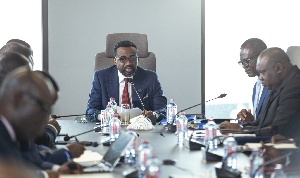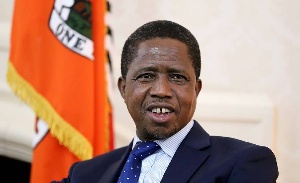- Home - News
- Elections 2024
- News Archive
- Crime & Punishment
- Politics
- Regional
- Editorial
- Health
- Ghanaians Abroad
- Tabloid
- Africa
- Religion
- Photo Archives
- Press Release
General News of Tuesday, 25 March 2025
Source: www.ghanawebbers.com
BoG Governor proposes mechanisms to make MPC’s decision more accessible
Dr. Johnson Asiama, Governor of the Bank of Ghana, has proposed changes to the Monetary Policy Committee (MPC). He wants to make their decisions more accessible. This could include publishing voting outcomes and improving policy statements.
He emphasized that forecasts should be simpler. This would help the public and market participants understand the policy better.
Dr. Asiama spoke at the 123rd regular meeting of the MPC in Accra on Monday. He believes these changes will strengthen credibility and build trust in the policy framework.
He noted that transparency in decision-making needs improvement. There is a perception that MPC decisions lack clear, data-driven reasoning.
The Governor praised external committee members Professors Joshua Abor and Ebo Turkson for their contributions.
He mentioned that inflation is easing but remains high at over 23 percent. Progress has been slow, especially month-to-month.
Structural drivers of food inflation are still persistent, he added. The external environment is supportive but increasingly volatile.
Dr. Asiama highlighted a strong trade surplus and solid reserve growth from gold exports and remittances. However, global tariff wars and geopolitical tensions could change this situation quickly.
These global factors may impact inflation, capital flows, and exchange rate stability as well. Domestically, he noted an expansionary fiscal outlook for 2024 with deficits exceeding targets.
There are signs of consolidation early in 2025, but questions remain about current measures' adequacy for upcoming IMF reviews.
Financial conditions are changing rapidly; liquidity has increased in the system. Commercial banks have raised concerns about the Cash Reserve Ratio framework's implications for inflation and credit growth.
While private sector credit is recovering nominally, real credit growth remains modest. Banks are cautious, and Non-Performing Loans levels are still concerning.
The microfinance and rural banking sectors show early signs of stability but need continued recapitalization and regulatory reforms to maintain confidence.
Dr. Asiama acknowledged that some challenges stem from past monetary and fiscal policy mistakes. These included losing fiscal control during macro stress periods and weak coordination between monetary policies.
Such issues have led to elevated inflation, impaired policy transmission, and lost credibility in policies.
He stressed that the MPC must reflect on these issues to avoid repeating past mistakes without assigning blame.
Deeper structural issues also need attention: underinvestment in agriculture, exchange rate misalignments, and deepening domestic financial markets are crucial areas to address.
While these issues do not directly affect today's rate decision, they will influence future monetary policy landscapes over time.
The Governor concluded by noting a convergence of risks: stubborn inflation, high liquidity levels, soft real interest rates, fragile fiscal recovery, and growing external uncertainty exist simultaneously.
However, he pointed out there are buffers available: strong reserves, improving sentiment, and credible policies can guide them through these challenges.











